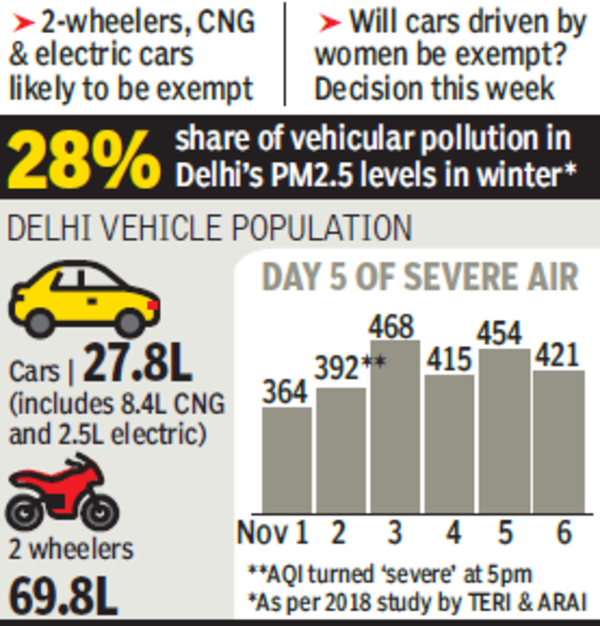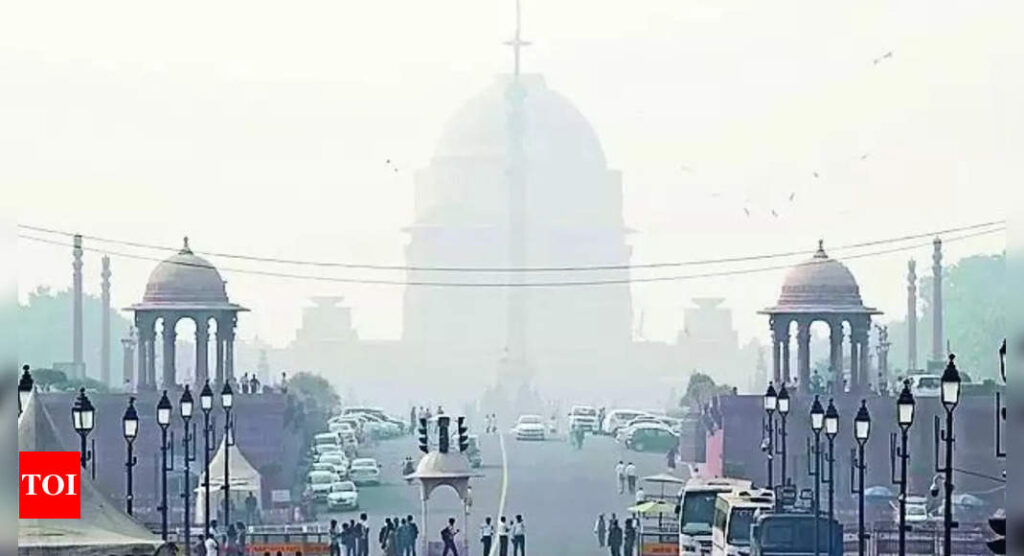[ad_1]
While the government would share details of the plan in the next two-three days, officials said electric and CNG-run cars and two-wheelers are likely to remain exempted from the restrictions.The first meeting to work out the modalities in the presence of transport department officials and Delhi traffic police will likely take place on Tuesday.
To safeguard the health of schoolchildren, the government also decided to suspend physical classes in all schools, except for students of classes X and XII preparing for board exams. A decision on making 50% of staff in government and private offices to work from home will be taken after Diwali.

The odd-even rule restricts the number of private cars on roads based on their number plates. Vehicles with even last digit (including zero) are allowed to run on even dates and odd-numbered cars can ply on odd dates. These curbs have been imposed in the capital three times in the past after being introduced in 2016.
The decision on implementing odd-even traffic curbs was taken in a meeting chaired by chief minister Arvind Kejriwal on Monday to discuss the alarming air quality in the capital.
A 2018 joint study by The Energy and Resources Institute (TERI) and Automotive Research Association of India (ARAI) says vehicular emissions contribute 28% to Delhi’s PM2.5 levels and 24% to PM10 during winters.
Addressing a press conference after the meeting, environment minister Rai said: “The odd-even scheme will come into effect in Delhi after Diwali, running from November 13 to November 20.”
He added that the government will take a decision to extend the traffic restrictions beyond November 20 after assessing the situation at that time.
In the previous editions, the government had exempted scooters and motorcycles, vehicles with CNG-stickers, women-only cars with children up to the age of 12 years and vehicles occupied by physically disabled persons.
In December 2017, the odd-even rule had to be called off at the last moment after the National Green Tribunal refused to exempt two-wheelers from the scheme.
Rai said that directives had been issued to implement stringent restrictions mandated under stage IV, the final of the Graded Response Action Plan (GRAP) in Delhi-NCR to control air pollution.
The restrictions under GRAP-IV, including a ban on all kinds of construction work and the entry of polluting trucks into the capital, kicked in on Sunday after air quality in the capital dropped to “severe plus” (AQI above 450) levels.
The minister said that air pollution may improve over the next few days due to an expected increase in wind speed. He, however, cautioned that the air quality may deteriorate again due to factors such as firecracker burning during Diwali. Rai said directions had been issued to the police to keep their teams on alert, as Diwali was just a few days away. He also urged the BJP governments in Uttar Pradesh and Haryana to impose a ban on fireworks in their states to prevent the situation from deteriorating further.
Rai added that the Delhi government had taken several long-term measures – introduction of electric buses, implementation of EV policy for private vehicles, increasing green cover and imposing ban on bursting crackers – to mitigate pollution, which had borne fruit.
[ad_2]
Source link










More Stories
Congress replaces Kamal Nath, names an OBC as Madhya Pradesh chief | India News
Fire breaks out in ITBP camp in Srinagar; none hurt | India News
Parliament Security: Co-villagers give clean chit to Lalit Jha, parents to move court | India News